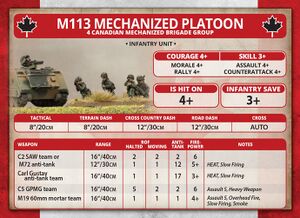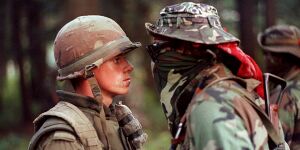Canadian Mechanized Platoon

"Whenever the Germans found the Canadian Corps coming into the line, they prepared for the worst."
- – David Lloyd-George
"Canada is very smooth. They have you believe that its wonderful – and it is – for them. Not wonderful for us, wonderful for them."
- – Donald Trump
The Canadian Forces have earned and maintained an enviable reputation as crack assault troops over the course of their history, and the infantry are the centerpiece of that legend. The Canadian rifleman has much in common with both his British and American counterparts, sporting equipment from all across the globe. The Canadian infantry contribution to NATO's war effort are split into two battalion-sized Regiments: The Royal 22e Régiment "Vandoos" and the Princess Patricia's Canadian Light Infantry (or PPCLI, incorrectly labeled as the PPLI in the Free Nations book), who bring Franco-Canadian vitriol and Prairie Fire respectively. Packing C1A1 FALs, C2 SAWs, M72 launchers, 60mm mortars, the Carl Gustav and a big fat .50 cal MG, these men are ready to start notching kills.
In Team Yankee

If you can get them within 16"/40cm of the baddies, these guys will win most fights. Beyond that? Well...
They're very similar to the Brits but with less stab and more boom. Much like their counterparts in the armour, these Canadian infantrymen need to stay mobile until they've found the perfect firing position to start an assault. While their rate of fire and firepower values can both be quite intensive, their entire arsenal is frustratingly short ranged. Not a single tool they have is effective outside the 40cm mark. As a consequence, their 3+ skill rating is a godsend. Canadians will have an easier time making movement orders than a lot of their NATO counterparts, therefore permitting them to maneuver across the board at a more efficient rate. This kind of hopping around will be required to line up the shots necessary to make their output count, and to avoid getting whittled down before they can bring their potential to bear. Almost all of your infantry teams have some form of AT, so anything dumb enough to get close enough and flash its side armour will die. If you do find a nice and cozy spot to open up, put the C5 GMPG to work. With ROF 5, it will eat up PACT infantry while providing cover for your other teams to move forward. Additionally, this lovely abundance of both firepower and rate of fire means that the Canadians will have a far easier time dislodging dug in infantry than their peers. Lastly, remember to save your one-use smoke when it will mean the difference between dead Russians or dead Canadians, this can often be a game-winning moment.
In summary, Canadian infantry is for holding objectives, denying ground, and assaulting fortified enemies. Don't discount how they're capable of some reliable and unorthodox tactics thanks to free smoke, a big honkin' machine gun and a better skill value. They won't keep pace with your Leopard C1's once disembarked, but will still be able to consistently outpace most other flavours of infantry. The M113 transports that come attached are nothing special outside of their armour value, but are just what you need to get the infantry into a position where they can hit the ground running and do some damage.
IRL

From the Boer Wars to Korea, through both the World Wars, the Canadians built up a strong and storied wartime history. Boasting having never lost a war, it's not hard to see why. Though a debate exists as to whether or not it was myth or reality, the Canadian Forces became known as some of the finest and most accurate shock troops and raiders the world had ever seen. Though as the World Wars gave way to the Cold War, a shift occurred in the Canadian army. The forces began to disarm and dismantle the large standing army that carried them through France, Italy and France again, instead favoring a much smaller and purely volunteer force. Conscription had always been a highly contentious issue across the nation, so it's abolition came as no surprise. As the Canadian forces decreased in size, funding did too, as successive governments saw increasingly little use for having a large military budget. Despite that, the Canadian infantry continued to be (and remain) a respected player in military affairs, nowadays known for quality training and excellent marksmanship.
Canadian equipment tended to lag behind the rest of NATO in terms of the technological cutting edge, often acquiring equivalent weapons and gear a fair while after their allies. This was said to be offset by the quality of the men who carried them, though again, there continues to be a debate as to the reality of such statements. Regardless, the stats presented for Team Yankee certainly reflect that emphasis on skill at arms.
| Canadian Forces in Team Yankee | |
|---|---|
| Tanks: | Leopard C1 |
| Transports: | M113 APC |
| Infantry: | Canadian Mechanized Platoon |
| Artillery: | M109 Field Battery - M125 81mm |
| Anti-Aircraft: | ADATS - M113 Blowpipe |
| Tank Hunters: | M150 TOW |
| Recon: | Lynx RECCE Patrol - M113 OP |
| US Support: | M1 Abrams - M60 Patton - US Mech Platoon - A-10 Warthog |
| WG Support: | Leopard 2 - Marder Panzergrenadiers - BO-105P - Tornado |